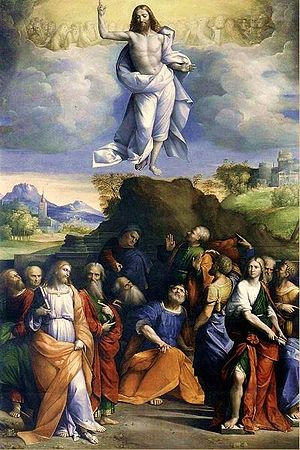This rosary meditation focuses on The Second Glorious Mystery — The Ascension. After rising from the dead in the First Glorious Mystery, Jesus physically ascended into Heaven. We profess this every time we recite the Apostle’s Creed — “On the third day He rose again; He ascended into Heaven, He is seated at the right hand of the Father, and He will come again to judge the living and the dead.” We must remember that ultimately we will have to account for our thoughts, words, and actions in front of Jesus who reigns in Heaven. However, the Church gives us tools that allow us to remain close to God and correct our faults before facing our final judgment.
“He will come again to judge the living and the dead.” Like many people, I find the idea of judgment scary. The word “judgment” conveys a trial, assessing guilt, and handing out punishment; none of which are very pleasant. In life, judging has a very negative connotation. We hear how we shouldn’t be so judgmental. Even when we are guilty (either legally or morally) many of us try to avoid admitting our faults and accepting the consequences. Instead we hide, we lie, or play the “blame game.” Deep down we want to be innocent, sinless, and virtuous but we often miss that mark. But in professing our inevitable judgment in the Apostle’s Creed we remind ourselves that we need to work at becoming more Christ-like. Understanding that our actions have consequences motivates us to avoid sin. And we avoid sin, not just to avoid punishment, but also realizing that sin separates us from Jesus Christ whom we love.
The purpose of knowing of our coming judgment is not to scare or depress us. In fact, God does not want to punish any of us. He desires all of us to one day enter into His kingdom. And He provides tools to help us avoid a harsh judgment. The most obvious tool He gives us is the Sacrament of Confession. This is our opportunity to set things straight with the Lord and remain in His grace. It’s our way of doing small course corrections so that we can remain on the path that ultimately leads us into His kingdom of Heaven. To put it another way, by routinely confessing our sins we confront our shortcomings while they are still small and manageable. Without acknowledging our sins those small shortcomings can turn into major problems and separate us from God’s grace not to mention make our lives miserable.
Another tool at our disposal to live in God’s graces is prayer. When we center our lives around God through prayer, that means we are not centering it around sin. In other words, earnest prayer can never be sinful so when we live a life of prayer we live without sin (unfortunately, no one has been able to obtain this lofty goal 100% of the time). The fact that we pray means that we acknowledge that Jesus is seated at the right hand of the Father and hears our prayers. After all, what would be the point of praying if we did not believe that Jesus hears us and guides us? When we pray we focus, even if only for a short time, on the Lord and ask for His help, thank Him, and listen to how He calls us to live. In short, we ask for the strength to live for His kingdom and earn our place that He has prepared for us when he ascended into Heaven.
When we meditate on this mystery, may we remember that our ultimate destination is Heaven. May we show our love for the Lord by not delaying our arrival in Heaven with a detour in Purgatory. And may we avoid mortal sin and risk loosing His kingdom entirely. Remembering our final judgment is not a terrible thing. Like remembering the consequences of breaking civil laws, we must always be mindful of the natural law that God imprints on our hearts and minds. Doing so will not only have its benefits in the afterlife, but will also manifest itself as an inner happiness in this life. Let us also remember to pray for those who are far from God’s graces. Let us pray for those who do not want to confront their eventual judgment but instead choose to hide, lie, and redirect blame. Because, as the old saying goes, “You can run, but you can’t hide.”
Related articles by Zemanta
- The Cost of Sin (anointedplace.wordpress.com)
- Fr. Frank Pavone: Why the Our Father is a Pro-life Prayer (Part 1) (deaconforlife.blogspot.com)
- A Practical Model for Prayer (slideshare.net)


